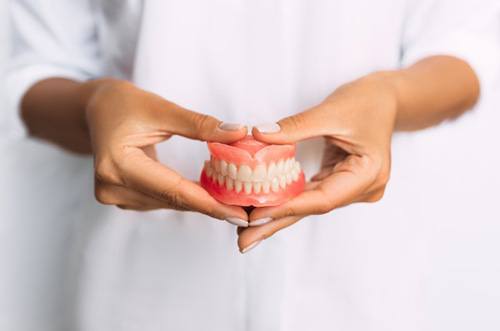Dentures–East Gwillimbury
Restore a Complete Smile with Dentures
If you've suffered extensive tooth loss or your teeth are beyond repair, you don't have to live with the consequences of an incomplete smile. Dentures have been used for generations to replace lost teeth. New materials and technologies provide a more comfortable fit than ever before. At Queensville Dental, we will rebuild a beautiful, functional smile that you'll be proud to share with the world.
Why Choose Queensville Dental for Dentures?
- High-Quality Materials
- Advanced Technology
- Natural-Looking Results
Who’s a Good Candidate for Dentures?

Extensive tooth loss can take its toll on how you eat and speak as well as your self-esteem. Having a smile you can be proud of can make all the difference, and people who smile frequently are generally seen as more confident, friendly, and trustworthy than the people around them, which can make it easier to make social connections or seize professional opportunities. Luckily, Dr. Goldberg can provide you with high-quality dentures that are incredibly lifelike and comfortable. Contact our office today to learn more.
Effects of Missing Teeth

Tooth loss is an unfortunately common problem, and it can be caused by factors like tooth decay, gum disease, and oral injuries. In addition to lowering one’s self-esteem, the loss of many teeth can lead to facial sagging, difficulty with chewing, trouble with speaking, and even further oral injuries or infections. The teeth are designed to share the burden of chewing with one another, and the loss of one can cause the others to bear more force than they can handle, which can lead to injuries and more rapid erosion of the enamel. To make matters worse, extensive tooth loss can make it much harder to enjoy the wide variety of tasty foods that the body needs for adequate nutrition.
What Qualifies You for Dentures?

Almost anyone can receive dentures to treat their extensive tooth loss. The patient will need to have sufficiently healthy gum tissue and jawbones as well as a commitment to proper oral hygiene. Dentures can be partial or full, and which one is right for you will largely depend on how many teeth you are missing.
While dentures are generally more affordable than other tooth-replacement methods, some patients may receive dental implants to hold their dentures in place, creating a sturdy hold that maximizes stability during chewing and speaking.
Alternative Tooth-Replacement Options

While dentures are both incredibly comfortable to wear and so fantastically lifelike that casual observers won’t even notice them, other tooth replacement options such as bridges or dental implants can be better choices for some patients.
- Dental bridges are used to replace one or several missing teeth in a row. They consist of a few dental crowns which are usually anchored to the healthy teeth on either side of the gap. However, some patients have their bridges supported with implants.
Dental implants are the ideal solution to tooth loss because they are surgically placed directly into the jawbone and host lifelike dental crowns that work just like real teeth. They require the patient to have healthy jawbones, and while they are more expensive than traditional dentures, they are permanent.
Types of Dentures

There are more options than ever to treat tooth loss. After examining your mouth and learning more about your preferences, your dentist will recommend either:
Partial Dentures

A partial denture can treat consecutive and non-consecutive tooth loss if you still have a few healthy teeth. Prosthetic teeth are set in a gum-colored base to fill the gaps from those you've lost. The base has a metal framework, which allows it to clip or clasp onto your teeth to stay in place.
Full Dentures

A full denture treats an entire arch of lost teeth. An impression of your mouth is taken to create an acrylic base that will hold your replacement teeth. It rests on top of your gum tissue and is held in place using suction.
Implant Dentures

Implant dentures differ from any other treatment because they replace both the roots and the crowns. 4 to 10 implant posts are surgically placed into your jaw to act as new roots. Your denture is attached to the post using abutments to create the next best thing to your real teeth.
How Dentures Are Made

Traditional dentures offer one of the most reliable and cost-effective ways to replace some or an entire arch of missing teeth. Once you receive your finalized prosthetics, you can be sure to enjoy a wide range of benefits for your smile and overall health, such as an improved bite and greater confidence. But what exactly goes on when making your dentures? By getting a closer look at the creation process, you might gain some insight into how your prosthetics are formed to rebuild your lost pearly whites.
What are Dentures Made Of?

Dentures are generally made of two components:
- The Base: This is the gum-colored structure that is created to hold your new teeth. The denture base is typically constructed out of acrylic, which can match seamlessly with your natural gum line. Partial dentures are often created out of acrylic along with metal clips that are used to clasp onto nearby healthy teeth for support. The base can also be created with nylon or resin.
- The Artificial Teeth: Your new teeth can usually be made out of acrylic or porcelain depending on the type of prosthetic being made. While both materials are tooth-colored, partial dentures often use acrylic because they aren’t very abrasive against natural teeth. For full dentures, porcelain is more popular, as it is incredibly durable.
The Denture Creation Process

There are multiple steps involved in constructing your prosthetics. Here’s a brief look at the creation process:
- Our team will first take detailed impressions of your gum line that will be used to construct the wax replica of your smile.
- Your impressions will be sent to a dental lab where they will begin the process of creating a model of your gums. Afterward, they’ll place your artificial teeth onto the base.
- Once the wax replica is shaped and sized to match your smile, it will be sent to our team for a fitting. If all looks well, we’ll send it back to the lab for completion.
- The lab technicians will then boil the dentures to melt off the wax while simultaneously replacing the plaster with acrylic to retain the shape of your prosthetics.
- The team will finally trim and polish the dentures completely before sending them back to us for the last fitting.
- You’ll return to our office to try on your permanent dentures. If they fit properly and you’re satisfied with the results, you’ll be free to enjoy your brand-new smile.
Adjusting to Your New Dentures

It’s quite normal for most patients to feel some discomfort when first wearing their new dentures. The good news is that your mouth will get used to the prosthetics with time. During your adjustment period, you’ll also want to practice using your new teeth for chewing and talking, as it will take a while before they start to feel normal for you. If you notice any changes or issues with your dentures, make sure to notify our team so we can help.
The Benefits of Dentures

Tooth loss is more than an aesthetic issue. It can affect your mental health, general wellness, and quality of life. You can't put a price on the benefits you'll gain by replacing your missing teeth, like:
- Improved Confidence: You'll enjoy higher self-esteem because you won't be worried about the gaps in your smile. Not to mention, treating tooth loss can take 10 years off your appearance, so you'll always look and feel your best.
- Better Oral Health: You can avoid common issues caused by tooth loss to prevent costly procedures down the road. You'll improve your oral health while reducing your future dental expenses.
- Improved General Wellness: You will be able to eat a variety of foods to maintain a balanced diet to support your overall wellness.
- Long-Lasting Results: Our office uses the best materials to provide long-lasting results with the right aftercare.
If you're ready to invest in a complete smile, take your first step by scheduling a consultation. Request an appointment through our website or call (289) 272-9013.
